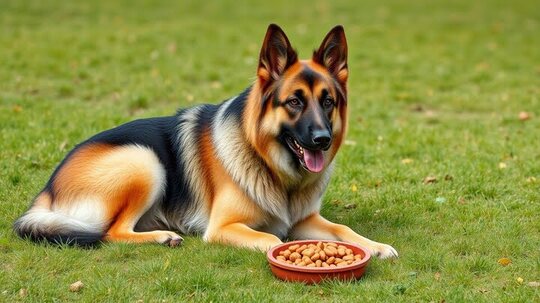Ensuring Optimal Health for Your Giant Companion
Large dog breeds, such as German Shepherds, Labradors, Great Danes, and Saint Bernards, have unique dietary requirements that differ from smaller dogs. As a dog owner, you know the joy and challenge of taking care of these gentle giants. But did you know that their nutritional needs are crucial to their long-term health and longevity?

In this article, we’ll explore the key aspects of the nutritional needs of large dog breeds, covering everything from calorie requirements and essential nutrients to special dietary considerations. This SEO-optimized guide will help you understand how to feed your large dog for optimal health and wellness.
Understanding the Metabolic Needs of Large Dog Breeds
Large dogs have slower metabolisms compared to smaller breeds, which means they generally burn fewer calories per pound of body weight. Despite their imposing size, they don’t require as many calories relative to their body mass as smaller dogs do. This slower metabolism is a crucial consideration when choosing the right diet for your big dog.
However, because of their larger size, they have increased needs for certain nutrients, such as joint-supporting compounds, that are not as critical for smaller dogs. These specific requirements must be factored into their diet to ensure their overall health.
Caloric Intake for Large Breeds
Feeding large dogs the correct amount of calories is essential to maintaining a healthy weight. Overfeeding can lead to obesity, which is particularly dangerous for big dogs because the excess weight puts strain on their joints, heart, and other organs.
The caloric intake of large dogs depends on factors such as age, activity level, and breed. For example:
- Puppies: Large breed puppies require more calories to fuel their rapid growth, but overfeeding can lead to developmental issues like hip dysplasia.
- Adult dogs: Adult large breeds need fewer calories per pound than puppies or small breeds. It’s important to avoid excess calories to prevent obesity.
- Senior dogs: As large dogs age, their metabolism slows further, so their caloric needs decrease. However, they may require more support in areas like joint health, so diet formulations for seniors are crucial.
Essential Nutrients for Large Dog Breeds
To support their overall health and well-being, large breed dogs need specific nutrients that cater to their size, activity level, and health challenges.
Protein for Muscle Maintenance
Large breeds have more muscle mass than smaller dogs, meaning they require a higher amount of protein to maintain their muscles. Protein is crucial for growth, muscle repair, and maintaining lean body mass.
High-quality animal proteins, such as chicken, beef, and fish, should be the primary source of protein in your dog’s diet. Look for dog food that lists animal protein as the first ingredient, ensuring that it is easily digestible and provides the necessary amino acids.
Healthy Fats for Energy and Skin Health
Fat is an important energy source for large-breed dogs. However, too much fat can lead to weight gain and associated health problems. It’s essential to strike the right balance by choosing high-quality sources of fats like fish oil or flaxseed oil. These fats also provide omega-3 and omega-6 fatty acids, which promote healthy skin and coat while reducing inflammation.
Joint-Supporting Nutrients: Glucosamine and Chondroitin
Large dogs are prone to joint issues, including arthritis and hip dysplasia. Nutrients like glucosamine and chondroitin play a critical role in maintaining healthy cartilage and reducing joint pain. These nutrients are often found in large-breed dog food formulas and can also be supplemented as needed.
Look for foods that contain natural sources of glucosamine, such as chicken cartilage or shellfish, to help support your dog’s joint health.
Calcium and Phosphorus for Bone Health
Large-breed dogs are prone to bone and joint problems due to their size and weight. Calcium and phosphorus are essential minerals that promote healthy bone development, particularly in growing puppies. However, an excess of these minerals can lead to bone malformations. This is why it’s critical to provide a balanced diet tailored to the needs of large-breed dogs, especially during puppyhood.
Special Considerations for Large Breed Puppies
Feeding large-breed puppies the right diet is crucial to ensuring their proper growth and development. These puppies grow quickly, but overfeeding or providing excessive nutrients can lead to serious health issues, such as skeletal problems.
Controlled Growth for Large Breed Puppies
Overfeeding a large breed puppy can cause them to grow too quickly, which places undue stress on their developing bones and joints. Rapid growth increases the risk of developmental orthopedic diseases, such as hip dysplasia.
To prevent this, large-breed puppy food is formulated to provide the appropriate levels of calories, calcium, and phosphorus for slow, steady growth. Avoid feeding your puppy adult dog food or standard puppy food, as these may not have the correct balance of nutrients for large breeds.
Avoiding Obesity in Large Dog Breeds
Obesity is a major concern for large-breed dogs. Due to their slower metabolism and tendency to overeat, it’s easy for these dogs to become overweight. Obesity in large dogs can lead to a range of health issues, including:
- Joint problems
- Diabetes
- Heart disease
- Shortened lifespan
To prevent obesity, it’s essential to monitor your dog’s weight and adjust their caloric intake as needed. Regular exercise is also critical for maintaining a healthy weight, but over-exercising puppies or elderly dogs can exacerbate joint issues. A balanced approach to diet and exercise is key to preventing obesity and its associated health problems.
Selecting the Right Dog Food for Large Breeds
Choosing the right dog food for your large dog is one of the most important decisions you’ll make as a pet owner. Look for food that is specifically formulated for large breeds. These formulations are designed to meet the unique needs of large dogs, with attention to nutrient levels that support joint health, slow growth in puppies, and prevent obesity.
Key things to look for when selecting large-breed dog food:
- First ingredient: High-quality animal protein (e.g., chicken, beef, or fish).
- Nutrient balance: Ensure the food contains the right balance of protein, fat, and carbohydrates.
- Joint support: Look for glucosamine, chondroitin, and omega-3 fatty acids to support joint health.
- Calcium and phosphorus: Ensure the food is designed to provide the appropriate amounts of these minerals for bone health, especially for puppies.
Additionally, avoid dog foods that contain artificial preservatives, colors, or fillers, as these offer no nutritional value and can harm your dog’s health in the long run.
Supplementing Your Large Dog’s Diet
While high-quality dog food will meet most of your large dog’s nutritional needs, certain supplements can help support specific health concerns. Common supplements for large dogs include:
- Glucosamine and chondroitin: For joint health and arthritis prevention.
- Fish oil: To provide omega-3 fatty acids for healthy skin, coat, and reduced inflammation.
- Probiotics: To support digestive health and immune function.
Always consult your veterinarian before adding supplements to your dog’s diet to ensure they are necessary and won’t cause imbalances.
Conclusion: Feeding Your Large Dog for Health and Longevity
Large-breed dogs have specific nutritional needs that require careful attention to ensure their health and well-being. By understanding their caloric needs, providing essential nutrients, and choosing the right dog food, you can help your large dog live a long, healthy life.
From ensuring controlled growth in puppies to maintaining joint health in adults, the right nutrition is key to preventing health issues commonly seen in large breeds. By feeding your large dog a balanced, nutrient-rich diet, you’re giving them the best possible foundation for a happy and active life.



